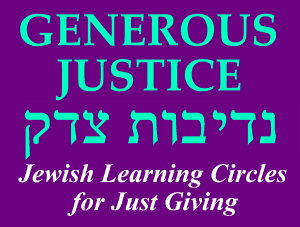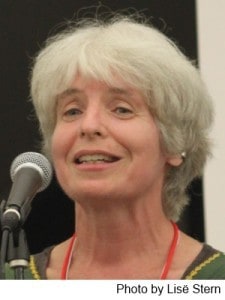By Rabbi Regina Sandler-Phillips
The words of the Shema call for love of God “with all your me’od.” Me’od ordinarily means very-much, and is generally translated in the Shema as strength, might, or power. But ancient rabbis understood this power quite specifically: “Love God with all your money.”
Money circulates—often inequitably, but it’s always moving among us. Talmudic  rabbis, observing their own generations of changing fortune, declared poverty to be “a wheel that revolves in the world.” Given all the uncertainties of the financial wheel in spin, they called for regular attention to distributive justice: “Just as each small metal scale joins into a great armor-plate, so with tzedakah each and every coin joins into a great heshbon.”
rabbis, observing their own generations of changing fortune, declared poverty to be “a wheel that revolves in the world.” Given all the uncertainties of the financial wheel in spin, they called for regular attention to distributive justice: “Just as each small metal scale joins into a great armor-plate, so with tzedakah each and every coin joins into a great heshbon.”
The Jewish ethical principle of heshbon (accountability) provides an immediate connection between ecology and economy, spirituality and social change. Every time we open our wallets or check our bank balances, we face choices of heshbon—and heshbon hanefesh ( “soul accounting”) includes personal finance. How are we literally spending each day of our lives?
Rooted in the agricultural imperatives of the shmita cycle is a practice of heshbon accessible to all of us. The release of debts in the sabbatical year originally followed six years of regular tithing. No longer a form of taxation, a tithe (one-tenth) is now a voluntary giving rate, one possible percentage of annual income. Studies show that today’s giving rates tend to shrink as affluence levels increase. In other words, those who earn more tend to share a lower percentage of their earnings.
We have the power to change that uncomfortable truth when we approach tzedakah as “just-giving”: simple, equitable, and regular. As we round out this shmita year, we can reclaim the ancient incremental practices that bring distributive justice back into our own hands.
Whatever our vision of the world may be, our financial support is needed to realize it. Even a half-tithe of 5 percent is more than double the average U.S. giving rate, and still leaves 95 percent for personal expenses. That’s a “great heshbon”!
The sage Ben Zoma taught that the wise are those who learn from every person; the brave are those who control (literally, “occupy”) their own impulses; the rich are those who rejoice in their own portions; and the honorable are those who honor creation and its creatures. This integrated four-fold teaching offers a path to greater love through personal and communal sustainability.
Together we can:
- Learn to live more simply,
- Channel our consumer impulses,
- Accept and celebrate our abundance, and
- Make financial decisions that are socially and environmentally sound.
When we set aside a regular percentage of income for just-giving, we discover how much we can really afford to contribute toward the world we envision. The earth can rest from our relentless consumption while we put our money where our mouths, hearts and minds are, making thoughtful adjustments as appropriate.
 Turning the tithe is the mission of Generous Justice, a new network of Jewish learning circles for just-giving, based on the rhythms of the shmita cycle. We’re mobilizing the dialogue across generations to create a culture of greater fairness and fulfillment for all. Millennials, middle-agers and elders from the U.S. and Canada are already represented in our ranks.
Turning the tithe is the mission of Generous Justice, a new network of Jewish learning circles for just-giving, based on the rhythms of the shmita cycle. We’re mobilizing the dialogue across generations to create a culture of greater fairness and fulfillment for all. Millennials, middle-agers and elders from the U.S. and Canada are already represented in our ranks.
The first Generous Justice leadership training will be part of the August 2015 National Havurah Committee Summer Institute in scenic New Hampshire, exploring the relationship between shmita and social justice. Each year participants leave the Institute reinvigorated and excited to return to their home communities to share new ideas and experiences.
If you can’t join us in New Hampshire, you can still try this at home. Parents and children of all ages, Occupy Wall Street and Move Your Money are invited to join our multimillennial conversation of Jewish prophets, sages, activists and artists.
The key is to share stories—and to focus on our own money choices, not someone else’s. Like counting the Omer toward revelation, this is a day-by-day practice. We welcome your participation as we reclaim the “great heshbon.”
 Rabbi Regina Sandler-Phillips is the project lead for Nedivut Tzedek / Generous Justice and the executive director of WAYS OF PEACE Community Resources, which promotes justice and kindness across lines of diversity and throughout the life cycle.
Rabbi Regina Sandler-Phillips is the project lead for Nedivut Tzedek / Generous Justice and the executive director of WAYS OF PEACE Community Resources, which promotes justice and kindness across lines of diversity and throughout the life cycle.




Comments are closed.